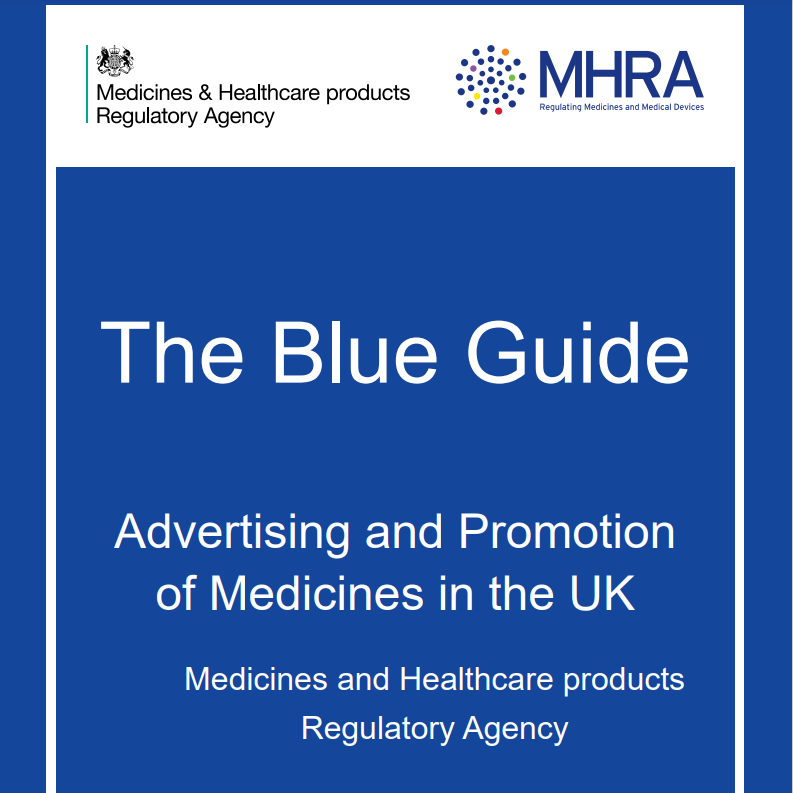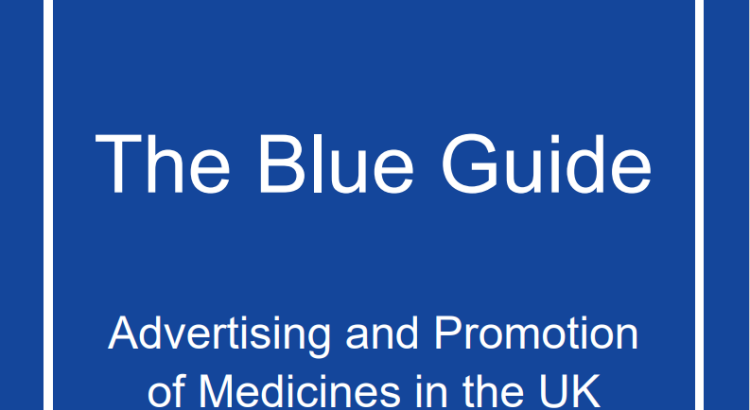
Is the MHRA failing in yet another of its responsibilities?
from: Dr Alan Black, retired pharmaceutical physician
There is recognition in British law that risks associated with medicines are greater than those associated with general commodities. Furthermore, concerns that potentially vulnerable, sick people and their carers could be affected, or even targeted, by promotional activities mean additional legal restrictions are placed on the promotion of medicines. The relevant UK legislation on advertising medicines is set out in Part 14 of the Human Medicines Regulations 2012 (the Regulations) and these are interpreted by the MHRA in their guidance document ‘The Blue Guide’. The MHRA are responsible for monitoring and enforcement of these regulations on behalf of UK government ministers.
The scope of the Regulations is extremely wide (deliberately so, as the potential adverse health outcomes, both personal and public, of misleading promotion of medicines are so great). For example, promotion of a medicinal product is defined as any thing or any activity which is intended to encourage prescription, supply, sale or consumption of medicinal products. Another example of this wide ranging scope is that The Blue Guide makes it abundantly clear that UK legislation is not simply a matter for pharmaceutical companies and it ‘makes it the responsibility of any person who promotes a medicine, including the licence holder, a private individual or any third party such as journalists, publishers or public relations agencies, to ensure compliance with the legislation’.
The Regulations contain some very specific restrictions, including an absolute prohibition on the promotion of a Prescription Only Medicine (POM) to the general public (regulation 284). But they also contain some general “quality standards” (Regulation 280) which include the requirements that any advertisement must “encourage the rational use of the product by presenting it objectively and without exaggerating its qualities” and “not be misleading”. Most importantly, advertisements must not misrepresent the safety profile of any medicine and there are specific requirements in the Regulations relating to the provision of safety information. In its Blue Guide the MHRA says unequivocally that “Advertising which states or implies that a product is “safe” is unacceptable. All medicines have the potential for side-effects and no medicine is completely risk free as individual patients respond differently to treatment.”
So the MHRA has wide ranging powers at its disposal (along with some serious sanctions, including criminal prosecution) and a clear obligation to use them to protect the British public from misleading and potentially dangerous promotion of medicines.
However, the past 2 years has revealed an inability or unwillingness on their part to even properly investigate, let alone take action against, any promotion of covid vaccines which may be in breach of the regulations. There have been numerous instances in which advertisements for covid vaccines placed in the media or on the internet by UK government departments and agencies have clearly been in breach of many of the regulatory and legal requirement and restrictions described above. (Some examples of such advertisements which have at the very least clearly breached the prohibition on the use of the word “safe” are given here 1, 2, 3, 4, 5 ). However, when complaints have been made by the public, the MHRA have refused to properly engage with them. The initial response of the MHRA is usually a dismissive assertion that that the advertisement is not an advertisement at all, but is part of a government “public health campaign”. When it was pointed out to them that an advertisement can be part of a public health campaign and still be an advertisement as defined in the regulations (indeed some are overtly labelled as “advertorial” or “paid promotion”), their next response was to claim that government public health campaigns are exempt from the advertising regulations. Requests for information about exactly where in the regulations this exemption can be found have as yet received no response. Now it’s worth pointing out here that to a very limited extent the MHRA are correct: Although there is usually a prohibition on advertising POMs to the public (Reg284), advertisements for a licensed vaccine product that have been approved by a Health Minister [remember this ministerial approval as I will refer to it again in a moment] as part of a Government controlled vaccination campaign ARE exempt from this prohibition (Regulation 292). However, although Reg 292 gives an exemption from Reg 284 it does NOT provide an exemption from Reg 280 (which sets out the quality standards discussed above). In the absence of any information from the MHRA about where exactly their claimed exemption from these quality standards can be found it would appear that the MHRA is misleadingly using Reg 292 to claim wide exemption of government advertisements from the requirements not to be misleading, to present information objectively, not to exaggerate the properties of a medicine and to avoid use of the word “safe”, along with other potential breaches of the Regulations.
It is not just advertisements for covid vaccines placed by government departments and agencies that the MHRA have refused to even investigate. For example, a number of UK doctors and scientists complained about a BBC documentary “Unvaccinated” last year. They detailed a great number of breaches of the advertising regulations, the MHRA again refused to investigate any of the allegations claiming that the programme did not meet the definition of an advertisement because there were no “product claims” made. When the complainants responded with a long list of product claims made (a specific covid vaccine was even referred to) in the programme, the MHRA then responded that these were actually not “product claims” at all but “factual statements”. This was a risible response as the whole point of the complaint was that the doctors and scientists had presented a long list of reasons why these “factual statements” were misleading and in many cases, not even factual at all. None of these reasons was addressed by the MHRA. Such circular arguments and dismissive, evasive responses from the MHRA demonstrated that they actually had no interest in properly engaging with the substance of the complaint and thus discharging their statutory responsibility to enforce compliance with the Regulations. As a result no proper investigation was ever made of the numerous, detailed and well-substantiated complaints made in this case.
It was pointed out above that there is an exemption from the prohibition on advertising a POM to the general public for advertisements for a licensed vaccine product that have been approved by a Health Minister. Examples have also been given above of advertisements making use of this exemption. These advertisements must therefore have been approved by a Minister. They are all nevertheless demonstrably in breach of MHRA guidance on the Regulations on at least one count (use of the word “safe”). It is unlikely that any Minister will be so familiar with the Advertising Regulations and The Blue Guide as to be confident enough to approve these advertisements without obtaining specialist advice. As the agency with statutory responsibility for enforcing these regulations, and also bearing in mind that it is the MHRA’s role to “pre-vet” all promotional material for all newly-licenced medicines, it is likely that the minister was advised to approve these advertisements by the MHRA themselves. Therefore we now find ourselves in a situation where the MHRA have approved for use advertisements which are in breach of the very advertising regulations which they themselves have a statutory responsibility to defend. It is therefore perhaps not surprising that they are unwilling to proceed with investigation of complaints against these advertisements. Unfortunately, once the MHRA has refused to investigate a complaint, or made a decision which, to the complainant, appears illogical, arbitrary or contrary to the evidence presented, there is currently no process for an independent review of that decision. Furthermore, there is no other formal process, other than recourse to the law and the courts, by which such a decision can be appealed. Such an expensive and time consuming prospect is not an attractive option for most members of the public who may nevertheless not be satisfied with how they have been treated by the MHRA.
The last two years have indicated that, with regard to the covid vaccines, the MHRA has been unable or unwilling to enforce both general and specific requirements of the Medicines Advertising Regulations 2012. As a result, information available to the UK public, and therefore their ability to make informed decisions about the efficacy and safety of the covid vaccines, may have been compromised. Whether this MHRA failing is caused by lack of resources, lack of expertise, conflicts of interests or political pressure and interference (or a combination of several of these factors) is as yet unclear but it is a situation which certainly merits further investigation.

